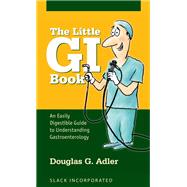What's the difference between a subtotal colectomy and a total proctocolectomy? How can you tell if a patient has cirrhosis? If a patient is jaundiced, should you order an ultrasound, an MRI scan, or an ERCP?
The Little GI Book: An Easily Digestible Guide to Understanding Gastroenterology answers these questions and more. Primarily designed for those new to the world of gastroenterology and hepatology, The Little GI Book will help you learn the core concepts of digestive health and disease while on the go.
Portable and handy, this conversational-style book packs a big punch! The Little GI Book will prove invaluable to residents, students, nurse practitioners, office staff, industry sales force, and anyone who works in the GI industry but isn’t a gastroenterologist.
Since gastroenterology as a specialty involves many organs, Dr. Douglas G. Adler uses a novel organ-based approach to give a comprehensive, soup-to-nuts “field guide” to gastrointestinal anatomy, physiology, disease states, and treatment. The Little GI Book guides the reader through the entire gastrointestinal tract, starting at the top with the esophagus, ending at the bottom with the colon and rectum, and covering everything in between: the stomach, small intestine, liver, pancreas, bile ducts, and gallbladder.
Written in a friendly, relaxed style and illustrated with over 50 key images and figures, The Little GI Book helps cement important concepts without a hiccup. Readers can approach the material without fear, and even have fun learning!
The Little GI Book: An Easily Digestible Guide to Understanding Gastroenterology answers these questions and more. Primarily designed for those new to the world of gastroenterology and hepatology, The Little GI Book will help you learn the core concepts of digestive health and disease while on the go.
Portable and handy, this conversational-style book packs a big punch! The Little GI Book will prove invaluable to residents, students, nurse practitioners, office staff, industry sales force, and anyone who works in the GI industry but isn’t a gastroenterologist.
Since gastroenterology as a specialty involves many organs, Dr. Douglas G. Adler uses a novel organ-based approach to give a comprehensive, soup-to-nuts “field guide” to gastrointestinal anatomy, physiology, disease states, and treatment. The Little GI Book guides the reader through the entire gastrointestinal tract, starting at the top with the esophagus, ending at the bottom with the colon and rectum, and covering everything in between: the stomach, small intestine, liver, pancreas, bile ducts, and gallbladder.
Written in a friendly, relaxed style and illustrated with over 50 key images and figures, The Little GI Book helps cement important concepts without a hiccup. Readers can approach the material without fear, and even have fun learning!








